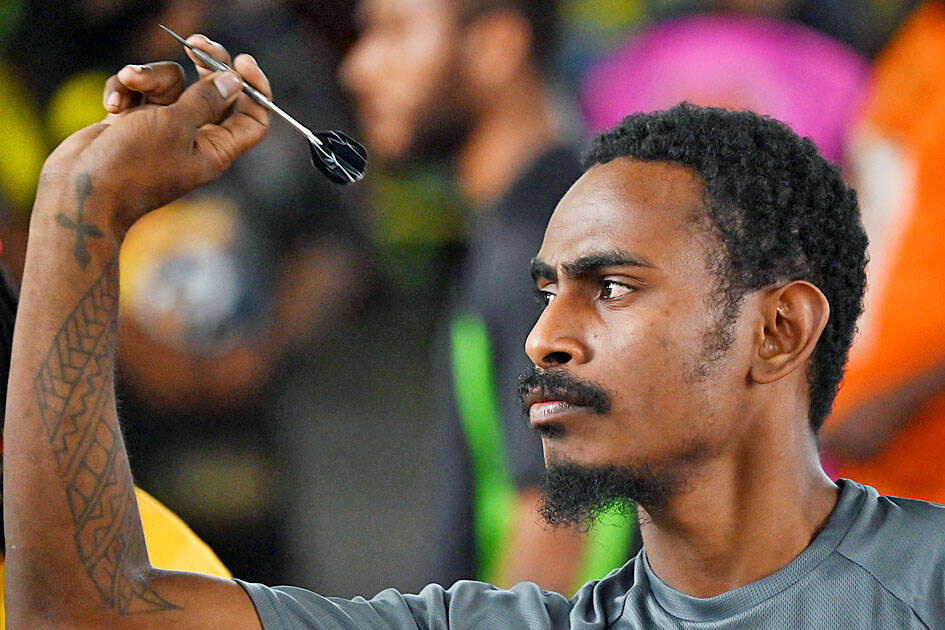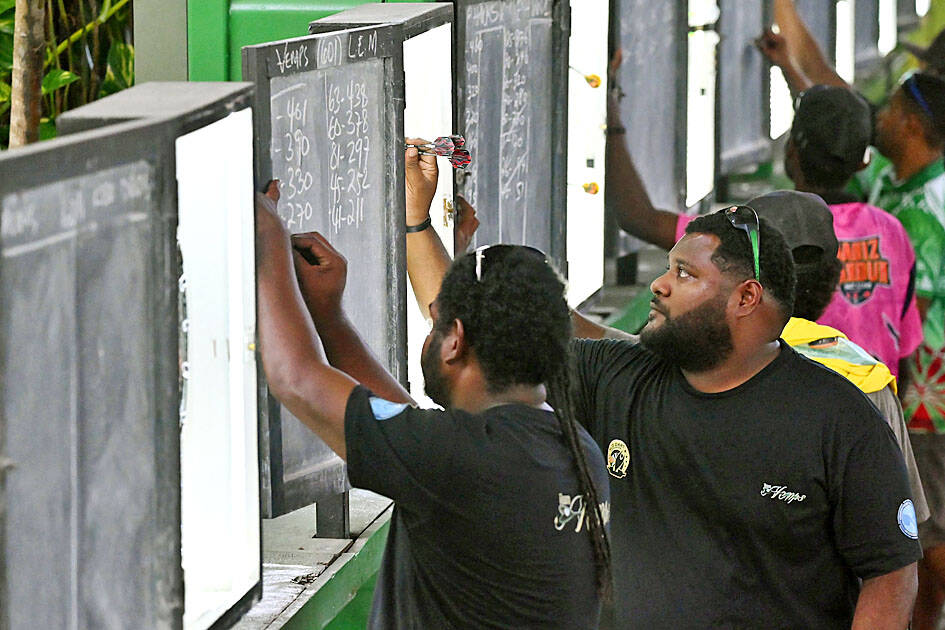At a smoky sports club in Papua New Guinea’s rough-and-tumble capital, security guards check for weapons as players with smiles stained betel-nut red throw darts at the wall.
About 150 Port Moresby locals have flocked to the Sports Inn to play or watch a game with origins in Middle Ages England that, half a millennium later, is setting the Pacific island nation alight.
Dreadlocked slinger Baxter Torie of the Telpepe Snipers pumps his fist as his teammate hits the 103 points needed to beat their nearest league rivals.

Photo: AFP
Games are taking place at this and 10 other boards, with uniformed players huddling, shouting pre-throw slogans and yelling “checkout” when they win.
“There’s a lot of interest. Everyone’s concentrating on playing rather than socializing; we’re happy about that,” said Torie, 43, who runs the games committee for the capital’s biggest darts association.
Darts is played across Papua New Guinea, with boards hung up in pubs or next to bus stations and market stalls.

Photo: AFP
In shanty towns, locals regularly throw darts to win bottles of Coca-Cola.
Yet things are serious now, Torie said.
Officials want the game to become an organized sport as it is in Europe, where darts moved from smoke-filled pubs to arena spectacles and made the world’s top players household names.
Darts in Papua New Guinea does not enjoy that support just yet, but its popularity soared after it was the first sport allowed back during the COVID-19 pandemic.
That was because players could follow protocols such as social distancing, given that darts is not primarily considered an indoor sport in the country.
The National Capital District Darts Association had just a dozen teams last year, but has 40 on the books this year and had to turn away more.
Some rural associations now boast 100 squads, association president Kapua Kapua said.
Fees for the season cost locals about 80 kina (US$22), which gets them league entry, hopes of a trophy and a potential cash prize of 3,000 kina, a sizeable reward in a country where many live on a few US dollars a day.
Kapua, a former rugby player, said that other funding has been hard to come by, but he hopes the game will one day become professional.
“Sponsors still see darts as a social pastime and not a sport, but we are changing that mindset slowly,” he said.
Kapua and Torie said that late players now forfeit games, digital scoring is soon to replace chalkboards and there is livestreaming for darts fans around the country.
To underscore how serious they are about developing the game, a judicial committee oversees punishments for acts of violence in a game often linked to a culture of heavy drinking.
“We want to stamp out troublemakers. It does reflect on the association, how the general public looks at us,” Kapua said.
Torie has also set up a games committee that includes five young volunteers: three students and two unemployed players.
They collectively earn 5 kina from every match in return for setting up boards and mats — a lifeline in a country where 40 percent of the country lives below the poverty line.
“Everybody agreed to assist the boys. I’m very proud,” Torie said.
One of them, 25-year-old Ezra Rava, said that playing darts has turned his life around.
“It has helped me a lot in my behavior. We used to drink a lot and cause trouble. Just out on the street, fighting,” he said. “Playing darts helped us to focus on something.”
Now he practices five hours a day in his front yard, dreaming of reaching events held by Professional Darts Corp, the premier global darts organization.
In a country with a poor reputation for gender equality, this darts league is also an arena where women can thrive. Many teams in the league are filled with women playing side-by-side with male counterparts, and some are captains.
“Everybody gets the same, there is no differentiation” in prize money, Kapua said.
At the national level, Papua New Guinea was recently forced to miss out on the South Pacific championships due to a lack of funding.
The country’s darts federation said it plans to rejoin the global darts body this year, enabling players to compete abroad.
Torie hopes the upward trajectory of the game means Papua New Guinea’s top players can one day hope to emulate their heroes from other countries.
“If you want to be like these guys, we have to change our attitude, change the way we play, change the way we think, and nothing is impossible,” he said.

Manchester City have reached do-or-die territory in the UEFA Champions League earlier than expected ahead of what Pep Guardiola has described as a “final” against Club Brugge today. City have disproved the suggestion a new format to Europe’s top club competition would remove any jeopardy for the top clubs as Guardiola stares down the barrel of failing to make the Champions League knockout stages for the first time in his career. The English champions have endured a torrid season both in their English Premier League title defense and on the continent. A run of one win in 13 games, which included Champions League

Oklahoma City star Shai Gilgeous-Alexander on Sunday poured in 35 points as the Thunder grabbed a bounce-back 118-108 victory in Portland to push their NBA-best record to 37-8. The Thunder, surprised by the short-handed Dallas Mavericks on Thursday, fended off a late surge from the Trail Blazers to snap their four-game winning streak. Jalen Williams scored 24 points and Isaiah Joe added 16 off the bench. Center Isaiah Hartenstein, back after a five-game absence with a calf injury, added 14 points, 11 rebounds, six assists and a big block. The Western Conference leaders were under pressure late as Portland, trailing by 15 heading

The Golden State Warriors on Wednesday withstood Oklahoma City star Shai Gilgeous-Alexander’s 52-point outburst to beat the Western Conference leading Thunder 116-109. Andrew Wiggins scored 27 points and Warriors superstar Stephen Curry scored 17 of his 21 points in the second half as Golden State erased a double-digit deficit and pulled away late for the victory. “We just stayed solid,” said Curry, who entered the contest mired in a shooting slump and had just four points on one basket in the first half. “Just all-around effort.” The Thunder, fueled by 31 first-half points from Gilgeous-Alexander, led by as many as 14 in the

Ousmane Dembele on Wednesday scored a hat-trick as Paris Saint-Germain romped to a 4-1 win at VfB Stuttgart and qualified for the UEFA Champions League knockout stages. PSG were at risk of elimination after a disappointing league stage, with three losses and a draw, but were utterly dominant against an outclassed Stuttgart side as they confirmed their place in the playoffs. With six minutes gone, Bradley Barcola headed PSG in front after Desire Doue stood a cross up at the back post following a corner. Stuttgart probed for an equalizer, but PSG hit on the counterattack, Dembele tapping a Barcola pass into an